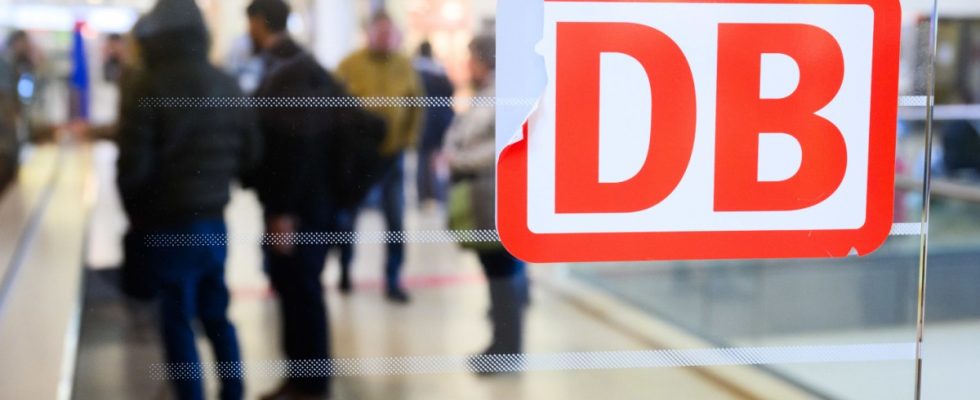It is an escalation with an announcement: After it briefly looked on Friday as if Deutsche Bahn and the German Locomotive Drivers’ Union (GDL) could get closer to each other, the GDL has now called for a strike again. It is scheduled to begin in passenger traffic at two o’clock on Tuesday morning and last until two o’clock in the morning on Wednesday. Freight transport will also be on strike for 24 hours, but from Monday evening. It is the sixth strike in the ongoing collective bargaining dispute.
Claus Weselsky makes good on his threat and announces a strike without the usual 48-hour notice period. The GDL boss had already indicated this at a press conference last Monday and spoke of “wave strikes” that would follow. Normally a union announces a strike 48 hours in advance so that the company on strike can prepare for it and – as in the case of the railway – can draw up an emergency timetable. This time the train only has a little less than 30 hours; The time between the announcement and the strike in freight transport is just under 22 hours.
The railway is optimistic that it will get an emergency timetable drawn up despite the shorter notice period. During the previous strikes in the ongoing collective bargaining dispute, around 20 percent of all long-distance trains ran. This time too, the railway wants to use “longer trains with more seats” in order to guarantee a basic service. However, the group has already announced “massive restrictions” on regional transport.
Federal Transport Minister Volker Wissing (FDP) harshly criticized the GDL and its boss Claus Weselsky on Sunday evening. According to Wissing, striking instead of negotiating is irresponsible. “The GDL has to talk and explore compromises. Things cannot continue like this,” said the minister. A formal arbitration procedure must urgently be initiated. “Mr. Weselsky continues to overreach.”
Deutsche Bahn had actually invited the GDL to collective bargaining talks on Monday. However, the GDL made its participation in further negotiations dependent on whether the railway would receive an improved offer by 6 p.m. on Sunday. However, the railway refused to submit such an offer and allowed the deadline to pass. The reaction followed just two hours later – in the form of a new strike. The GDL announced on Sunday evening that Deutsche Bahn was “continuing the provocation and is inevitably forcing the GDL to continue the dispute, to the chagrin of DB customers.”
The German train speaks of a “sheer impertinence” for rail travelers and business. The strike will have a massive impact on rail operations in the country.
However, the new escalation shouldn’t surprise the railways too much: GDL boss Weselsky had made it clear that he would only return to the negotiating table in the event of a new offer. The railway refused him this – knowing the consequences. “We are convinced that we will only be able to reach an agreement through dialogue at the negotiating table,” said Deutsche Bahn Human Resources Director Martin Seiler. He is of the opinion that in this phase of the negotiations it is “not productive” to “transition into a written exchange of offers and answers”.
Instead, the railway would like to reach a compromise in personal negotiations, based on a paper that the moderators in the collective bargaining dispute – the former Federal Interior Minister Thomas de Maizière and Schleswig-Holstein’s Prime Minister Daniel Günther – prepared; This also includes shortening weekly working hours from 38 to 36 hours with full wage compensation until 2028. The GDL is calling for one hour less working time per week for shift workers, namely 35 hours.
Weselsky already had it on Friday the procedure proposed by the railway was rejected. The GDL has “no new and improved offer that would justify withdrawing from industrial action and re-entering negotiations.” The wording “to conclude the negotiations based on the moderators’ overall proposal of February 26, 2024” alone is not a new offer. Weselsky accuses the railway of “unnecessarily or even deliberately” exacerbating the conflict.
The railway has, however, suggested another solution: The company is prepared to enter into formal arbitration, according to a statement on Sunday. During arbitration, one or two people are appointed as neutral third parties in order to reach a collective agreement. In contrast to the moderators already in place, arbitrators actually take over the conduct of the negotiations. If the disputing parties do not reach an amicable agreement, an arbitrator’s decision will be made at the end of the arbitration. However, both sides are not bound by such an arbitrator’s decision, but are free to decide whether they agree to the result or not.
But it looks like it’s not just bad news for rail customers at the beginning of the week: As soon as the warning strike by Lufthansa ground staff is over, the cabin union UFO calls on the around 19,000 flight attendants from Lufthansa and Lufthansa Cityline to go on strike this Tuesday and Wednesday . All departures from Frankfurt will be on strike from 4 a.m. to 11 p.m. on Tuesday and all departures from Munich on Wednesday, as UFO announced.

